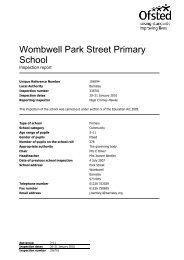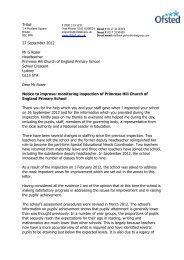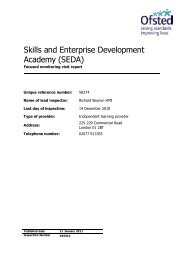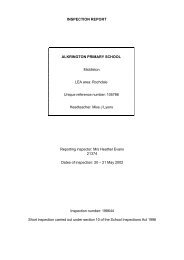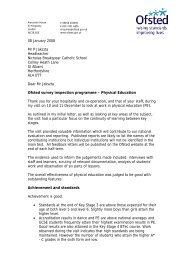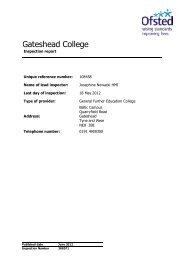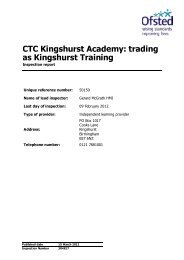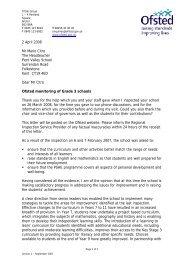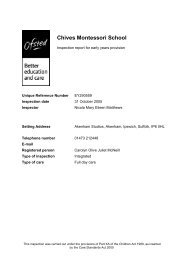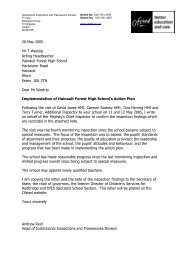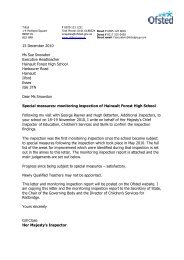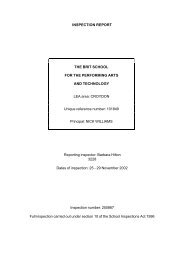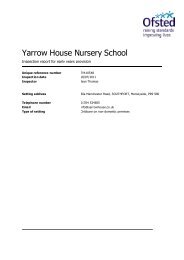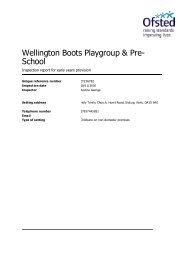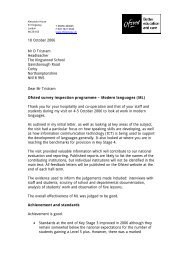Brune Park Community College - Ofsted
Brune Park Community College - Ofsted
Brune Park Community College - Ofsted
You also want an ePaper? Increase the reach of your titles
YUMPU automatically turns print PDFs into web optimized ePapers that Google loves.
<strong>Brune</strong> <strong>Park</strong> <strong>Community</strong> <strong>College</strong><br />
Inspection report<br />
Unique reference number 116472<br />
Local authority Hampshire<br />
Inspection number 385860<br />
Inspection dates 23–24 May 2012<br />
Lead inspector Christopher Russell HMI<br />
This inspection of the school was carried out under section 5 of the Education Act 2005.<br />
Type of school Comprehensive<br />
School category <strong>Community</strong><br />
Age range of pupils 11–16<br />
Gender of pupils Mixed<br />
Nu mber of pupils on the school roll 1,576<br />
Appropriate authority The governing body<br />
Chair Daphne Rose<br />
Headteacher Christopher Anders<br />
Date of previous school inspection 22–23 March 2011<br />
School address Military Road<br />
Age group 11–16<br />
Inspection date(s) 23–24 May 2012<br />
Inspection number 385860<br />
Gosport<br />
Hampshire<br />
PO12 3BU<br />
Telephone number 023 9261 6000<br />
Fax number 023 9261 6006<br />
Email address info@brunepark.co.uk
Inspection report: <strong>Brune</strong> <strong>Park</strong> <strong>Community</strong> <strong>College</strong>, 23–24 May 2012 2 of 12<br />
The Office for Standards in Education, Children's Services and Skills (<strong>Ofsted</strong>) regulates and inspects to<br />
achieve excellence in the care of children and young people, and in education and skills for learners of<br />
all ages. It regulates and inspects childcare and children's social care, and inspects the Children and<br />
Family Court Advisory Support Service (Cafcass), schools, colleges, initial teacher training, work-based<br />
learning and skills training, adult and community learning, and education and training in prisons and<br />
other secure establishments. It assesses council children’s services, and inspects services for looked<br />
after children, safeguarding and child protection.<br />
Further copies of this report are obtainable from the school. Under the Education Act 2005, the school<br />
must provide a copy of this report free of charge to certain categories of people. A charge not<br />
exceeding the full cost of reproduction may be made for any other copies supplied.<br />
If you would like a copy of this document in a different format, such as large print or Braille, please<br />
telephone 0300 123 4234, or email enquiries@ofsted.gov.uk.<br />
You may copy all or parts of this document for non-commercial educational purposes, as long as you<br />
give details of the source and date of publication and do not alter the information in any way.<br />
To receive regular email alerts about new publications, including survey reports and school inspection<br />
reports, please visit our website and go to ‘Subscribe’.<br />
Piccadilly Gate<br />
Store St<br />
Manchester<br />
M1 2WD<br />
T: 0300 123 4234<br />
Textphone: 0161 618 8524<br />
E: enquiries@ofsted.gov.uk<br />
W: www.ofsted.gov.uk<br />
© Crown copyright 2012<br />
You can use Parent View to give <strong>Ofsted</strong> your opinion on your child’s school.<br />
<strong>Ofsted</strong> will use the information parents and carers provide when deciding<br />
which schools to inspect and when.<br />
You can also use Parent View to find out what other parents and carers think<br />
about schools in England. You can visit www.parentview.ofsted.gov.uk, or<br />
look for the link on the main <strong>Ofsted</strong> website: www.ofsted.gov.uk
Inspection report: <strong>Brune</strong> <strong>Park</strong> <strong>Community</strong> <strong>College</strong>, 23–24 May 2012 3 of 12<br />
Introduction<br />
Inspection team<br />
Christopher Russell Her Majesty’s Inspector<br />
Fran Ashworth Additional Inspector<br />
John Laver Additional Inspector<br />
Philip Storey Additional Inspector<br />
Patricia MacLachlan Additional Inspector<br />
This inspection was carried out with two days’ notice. Forty five lessons were<br />
observed, taught by 44 teachers. Meetings were held with students, staff, the Chair<br />
of the Governing Body and local authority representatives. Inspectors took account<br />
of the 79 responses to the online Parent View survey in planning the inspection,<br />
observed the school’s work, and looked at a wide range of documentation including<br />
116 questionnaires completed by parents and carers, and others completed by staff<br />
and students.<br />
Information about the school<br />
<strong>Brune</strong> <strong>Park</strong> is a larger-than-average-sized school with a performing arts specialism.<br />
The proportion of students known to be eligible for free school meals is slightly<br />
above average. The proportions of students from minority ethnic groups or who<br />
speak English as an additional language are low. The overall proportion of disabled<br />
pupils and those who have special educational needs is average, although the<br />
proportion of students who have statements or are supported at school action plus is<br />
above average. The school currently meets the government’s floor standards, which<br />
set minimum expectations for students’ attainment and progress.<br />
When the school was last inspected it was given a notice to improve. Significant<br />
improvement was required in relation to students’ achievement. An <strong>Ofsted</strong><br />
monitoring inspection in November 2011 judged the school to be making satisfactory<br />
progress in tackling the issues identified.<br />
The previous headteacher left the school at the end of the summer term 2011. The<br />
school has since been led by an interim executive headteacher, who is a National<br />
Leader of Education and the headteacher of <strong>Park</strong> <strong>Community</strong> School in Hampshire.<br />
He typically spends three days a week at <strong>Brune</strong> <strong>Park</strong>. A substantive headteacher will<br />
take up post in September 2012.
Inspection report: <strong>Brune</strong> <strong>Park</strong> <strong>Community</strong> <strong>College</strong>, 23–24 May 2012 4 of 12<br />
Inspection grades: 1 is outstanding, 2 is good, 3 is satisfactory, and 4 is inadequate<br />
Please turn to the glossary for a description of the grades and inspection terms<br />
Inspection judgements<br />
Overall effectiveness<br />
Achievement of pupils<br />
Quality of teaching<br />
Behaviour and safety of pupils<br />
Leadership and management<br />
Key findings<br />
� <strong>Brune</strong> <strong>Park</strong> is now securely satisfactory. It is not yet good because the quality of<br />
teaching is variable and students therefore typically make satisfactory rather<br />
than better progress. In accordance with section 13 (5) of the Education A ct<br />
2005, Her Majesty’s Chief Inspector is of the opinion that the school no longer<br />
requires significant improvement. Schools whose overall effectiveness is judged<br />
satisfactory may receive a monitoring visit by an <strong>Ofsted</strong> inspector before their<br />
next section 5 inspection.<br />
� The interim executive headteacher has achieved a considerable amount this<br />
year. The school now has a clear direction. Senior leaders have an accurate and<br />
realistic understanding of the school’s strengths and weaknesses; they know<br />
that much work remains to be done to make <strong>Brune</strong> <strong>Park</strong> a good school. The<br />
school’s leaders have rightly focused most of their energies on eradicating<br />
inadequate teaching. This has been done rigorously: any less-effective teaching<br />
has been tackled systematically and useful work is being done to drive up the<br />
quality of teaching.<br />
� As a result, teaching has improved and inadequate teaching is now rare.<br />
However, the overall quality is still variable. In particular, not all lessons provide<br />
an appropriate level of challenge for all students in the class. Many students’<br />
weak literacy skills also hamper their progress. Teachers across the school do<br />
not provide enough support to help students to overcome these difficulties.<br />
� Better teaching has led to a rise in achievement, which is now satisfactory and<br />
continuing to improve. Any remaining variability in the patterns of achievement<br />
across different groups of students is reducing.<br />
� Students’ attitudes and behaviour have improved. While lessons are still<br />
sometimes disrupted, much behaviour in classrooms and around the school is<br />
now good. Attendance is also improving, although still slightly below average.<br />
3<br />
3<br />
3<br />
3<br />
3
Inspection report: <strong>Brune</strong> <strong>Park</strong> <strong>Community</strong> <strong>College</strong>, 23–24 May 2012 5 of 12<br />
Inspection grades: 1 is outstanding, 2 is good, 3 is satisfactory, and 4 is inadequate<br />
Please turn to the glossary for a description of the grades and inspection terms<br />
What does the school need to do to improve further?<br />
� Reduce the remaining variability in teaching by ensuring that:<br />
all lessons are pitched at an appropriate level for the class<br />
lesson activities are shaped to fit the ability levels of the different students<br />
in the class<br />
teachers do not spend too long talking to the whole class<br />
lessons provide more extensive opportunities for students to work<br />
independently and with each other.<br />
� Ensure that all teachers take responsibility for improving students’ literacy skills<br />
in their subjects.<br />
Main report<br />
Achievement of pupils<br />
From starting points in Year 7 that are generally below average, students now make<br />
satisfactory progress as they move through the school. The large majority of parents<br />
and carers who responded to the inspection questionnaire or Parent View are now<br />
satisfied with the progress that their children are making.<br />
GCSE examination results improved in 2011 and were the best in the school’s recent<br />
history, although they were still below national averages. There is a range of<br />
evidence to show that the school is on track to make further improvements this year<br />
and that these students’ attainment is likely to be broadly average.<br />
Patterns of achievement between groups of students and across different curriculum<br />
subjects have been very variable in recent years. At the time of the last inspection<br />
disabled students and those who have special educational needs were making<br />
inadequate progress. These students are now making satisfactory progress. There is<br />
still some variability in the performance of different groups of students across the<br />
range of subjects and some students have weak reading and writing skills. However,<br />
differences are evening out and no one group is now poorly served by the school.<br />
Students achieve well in the specialist performing arts subjects.<br />
Quality of teaching<br />
Teaching has improved in the past year. At the time of the monitoring visit in<br />
November a significant amount of teaching was inadequate or barely satisfactory;<br />
this is no longer the case. Teaching is now satisfactory overall, but there is also<br />
much good teaching. Lessons are typically calm and productive, and relationships<br />
between students and staff generally positive and friendly. Most students<br />
concentrate well in lessons and collaborate positively in pairs and groups. Some<br />
teaching is outstanding, such as in a Year 10 drama lesson observed during the
Inspection report: <strong>Brune</strong> <strong>Park</strong> <strong>Community</strong> <strong>College</strong>, 23–24 May 2012 6 of 12<br />
Inspection grades: 1 is outstanding, 2 is good, 3 is satisfactory, and 4 is inadequate<br />
Please turn to the glossary for a description of the grades and inspection terms<br />
inspection. Students made rapid progress in this lesson because of the teacher’s<br />
thorough preparation, ability to motivate and excite students, systematic building of<br />
dramatic skills over time, and excellent questioning skills.<br />
Lesson planning has improved, although not all teachers are able to implement these<br />
better lesson plans to their full effect. Teachers’ planning takes better account of the<br />
need to meet the particular needs of disabled pupils and those with special<br />
educational needs. This, and the fact that these students are now provided with<br />
improved support outside of lessons, means that they now make better progress.<br />
There are a number of general weaknesses in less-effective lessons. The first is that<br />
work is pitched at the wrong level for some or all of the students. In some cases the<br />
lesson is pitched at the wrong level for everyone, so work is too easy or difficult for<br />
the whole class. In other cases everyone in the class does exactly the same work, so<br />
it does not provide the right level of challenge for the most- or least-able students in<br />
the class. Teachers also sometimes spend too much time talking to the whole class.<br />
This can be demotivating for students and can leave too little time for them to work<br />
more actively, on their own or with each other.<br />
Students generally know their targets. Marking across the school is variable. While<br />
there is good practice in some subjects, other marking is sketchy and does not<br />
provide students with a clear enough picture of how to improve and meet their<br />
targets.<br />
Many students arrive at the school with significant weaknesses in their literacy and<br />
language skills. This hampers their progress in subjects across the curriculum. Staff<br />
are now better at identifying students who have weak literacy and language skills.<br />
These students are also being provided with better individual support to help them to<br />
overcome these barriers. For example, a small group of Year 8 students has been set<br />
up to receive intensive, personalised literacy support; this has led to significant<br />
improvements in their reading and spelling ages. However, many teachers across the<br />
school do not do enough to support the development of students’ literacy skills<br />
through their subject teaching.<br />
Responses to the inspection questionnaire and Parent View show that the large<br />
majority of parents and carers are satisfied with their children’s teaching. Most<br />
students also feel that they are generally taught well, although they also point to<br />
variability in teaching across the school. This view was confirmed by the inspection<br />
evidence.<br />
Behaviour and safety of pupils<br />
Behaviour has improved. It is satisfactory overall, but much behaviour in lessons and<br />
around the site is now good.<br />
Many of the parents and carers who replied to the inspection questionnaire or<br />
responded to Parent View expressed concerns about misbehaviour and disruption to
Inspection report: <strong>Brune</strong> <strong>Park</strong> <strong>Community</strong> <strong>College</strong>, 23–24 May 2012 7 of 12<br />
Inspection grades: 1 is outstanding, 2 is good, 3 is satisfactory, and 4 is inadequate<br />
Please turn to the glossary for a description of the grades and inspection terms<br />
lessons. Inspectors spent a considerable amount of time investigating these<br />
concerns. Only a small amount of poor behaviour was observed during the<br />
inspection. Students said that behaviour has improved over the past year. They<br />
recognise that much is being done to improve behaviour and the school’s ethos. For<br />
example, they recognise the value of additional supervision outside of lessons by<br />
staff wearing high-visibility jackets. Most students say that lesson disruption is now<br />
relatively rare and that, when it does occur, it tends to be minor. Some younger<br />
students in particular feel that lesson disruption is more common and sometimes<br />
more serious. Students also say that not all staff apply the school’s classroom<br />
behaviour policy consistently.<br />
The vast majority of students say that they feel safe in school; most parents and<br />
carers agree with this view, although a few who completed the questionnaire raised<br />
concerns about bullying. Most students say that bullying is uncommon and that staff<br />
deal effectively with any incidents of the different kinds of bullying that do occur. The<br />
number of recorded bullying incidents has fallen in the past year.<br />
Attendance has improved this year, although it is still slightly below average. The<br />
proportion of students who are more persistent non-attenders is relatively high,<br />
although gradually falling.<br />
Staff are tenacious in their attempts to help students progress to purposeful activity<br />
when they leave. As a result, the proportion of leavers not in education, employment<br />
or training is below the Hampshire average.<br />
Leadership and management<br />
The interim executive headteacher has provided strong and determined leadership<br />
and a clear direction for the school. The school is now in a much stronger position to<br />
sustain and continue its improvement. Much is now expected of staff. Given the<br />
profile of teaching at the start of the year, senior leaders’ main focus has had to be<br />
on eliminating inadequate or barely satisfactory teaching. This work has been<br />
undertaken rigorously and has had clear results; the focus is now moving more to<br />
raising satisfactory teaching to good. The interim executive headteacher’s other<br />
school has played a very useful role in <strong>Brune</strong> <strong>Park</strong>’s improvement. For example,<br />
senior leaders from the partner school have worked intensively with underperforming<br />
teachers at <strong>Brune</strong> <strong>Park</strong> and a number of heads of faculty from the two schools have<br />
worked together.<br />
Useful work is also being done to ensure that middle leaders are consistently able to<br />
make a full contribution to the school’s improvement. However, the school<br />
recognises that, while many middle leaders are very effective, practice is inconsistent<br />
and not all are yet able to play a full role in the school’s improvement. The governing<br />
body now has a clearer understanding of the school’s strengths and weaknesses, and<br />
is providing a greater degree of challenge.
Inspection report: <strong>Brune</strong> <strong>Park</strong> <strong>Community</strong> <strong>College</strong>, 23–24 May 2012 8 of 12<br />
Inspection grades: 1 is outstanding, 2 is good, 3 is satisfactory, and 4 is inadequate<br />
Please turn to the glossary for a description of the grades and inspection terms<br />
The curriculum meets students’ needs appropriately. A range of options are available<br />
at Key Stage 4, including a number of popular vocational courses. Enrichment<br />
opportunities enhance the curriculum well and make a strong contribution to<br />
students’ spiritual, moral, social and cultural development, as does the school’s<br />
house system. The contribution of the performing arts specialism is particularly<br />
notable: students, for example, have a wide range of opportunities to become<br />
involved in school productions and performances. The range of extra-curricular<br />
opportunities has increased significantly over the past year.<br />
The school has appropriate regard to the need to promote equality and tackle<br />
discrimination. Systems for collecting, analysing and using data about students’<br />
achievement have improved. As a result, staff are now able to look more closely at<br />
the achievement of different groups of students; results show that any differences<br />
are reducing. The systems and processes that keep students safe meet government<br />
requirements.
Inspection report: <strong>Brune</strong> <strong>Park</strong> <strong>Community</strong> <strong>College</strong>, 23–24 May 2012 9 of 12<br />
Glossary<br />
What inspection judgements mean<br />
Grade Judgement Description<br />
Grade 1 Outstanding These features are highly effective. An outstanding<br />
school provides exceptionally well for all its pupils’ needs.<br />
Grade 2 Good These are very positive features of a school. A school<br />
that is good is serving its pupils well.<br />
Grade 3 Satisfactory These features are of reasonable quality. A satisfactory<br />
school is providing adequately for its pupils.<br />
Grade 4 Inadequate These features are not of an acceptable standard. An<br />
inadequate school needs to make significant<br />
improvement in order to meet the needs of its pupils.<br />
<strong>Ofsted</strong> inspectors will make further visits until it<br />
improves.<br />
Overall effectiveness of schools<br />
Overall effectiveness judgement (percentage of schools)<br />
Type of school Outstanding Good Satisfactory Inadequate<br />
Nursery schools 54 42 2 2<br />
Primary schools 14 49 32 6<br />
Secondary<br />
schools<br />
20 39 34 7<br />
Special schools 33 45 20 3<br />
Pupil referral<br />
units<br />
9 55 28 8<br />
All schools 16 47 31 6<br />
New school inspection arrangements have been introduced from 1 January 2012. This means that<br />
inspectors make judgements that were not made previously.<br />
The data in the table above are for the period 1 September to 31 December 2011 and represent<br />
judgements that were made under the school inspection arrangements that were introduced on 1<br />
September 2009. These data are consistent with the latest published official statistics about<br />
maintained school inspection outcomes (see www.ofsted.gov.uk).<br />
The sample of schools inspected during 2010/11 was not representative of all schools nationally, as<br />
weaker schools are inspected more frequently than good or outstanding schools.<br />
Primary schools include primary academy converters. Secondary schools include secondary academy<br />
converters, sponsor-led academies and city technology colleges. Special schools include special<br />
academy converters and non-maintained special schools.<br />
Percentages are rounded and do not always add exactly to 100.
Inspection report: <strong>Brune</strong> <strong>Park</strong> <strong>Community</strong> <strong>College</strong>, 23–24 May 2012 10 of 12<br />
Common terminology used by inspectors<br />
Achievement: the progress and success of a pupil in their<br />
learning and development taking account of their<br />
attainment.<br />
Attainment: the standard of the pupils’ work shown by test and<br />
examination results and in lessons.<br />
Attendance: the regular attendance of pupils at school and in<br />
lessons, taking into account the school’s efforts to<br />
encourage good attendance.<br />
Behaviour: how well pupils behave in lessons, with emphasis<br />
on their attitude to learning. Pupils’ punctuality to<br />
lessons and their conduct around the school.<br />
Capacity to improve: the proven ability of the school to continue<br />
improving based on its self-evaluation and what<br />
the school has accomplished so far and on the<br />
quality of its systems to maintain improvement.<br />
Floor standards: the national minimum expectation of attainment<br />
and progression measures.<br />
Leadership and management: the contribution of all the staff with responsibilities,<br />
not just the governors and headteacher, to<br />
identifying priorities, directing and motivating staff<br />
and running the school.<br />
Learning: how well pupils acquire knowledge, develop their<br />
understanding, learn and practise skills and are<br />
developing their competence as learners.<br />
Overall effectiveness: inspectors form a judgement on a school’s overall<br />
effectiveness based on the findings from their<br />
inspection of the school.<br />
Progress: the rate at which pupils are learning in lessons and<br />
over longer periods of time. It is often measured<br />
by comparing the pupils’ attainment at the end of a<br />
key stage with their attainment when they started.<br />
Safety: how safe pupils are in school, including in lessons;<br />
and their understanding of risks. Pupils’ freedom<br />
from bullying and harassment. How well the school<br />
promotes safety, for example e-learning.
Inspection report: <strong>Brune</strong> <strong>Park</strong> <strong>Community</strong> <strong>College</strong>, 23–24 May 2012 11 of 12<br />
This letter is provided for the school, parents and<br />
carers to share with their children. It describes <strong>Ofsted</strong>’s<br />
main findings from the inspection of their school.<br />
28 May 2012<br />
Dear Students<br />
Inspection of <strong>Brune</strong> <strong>Park</strong> <strong>Community</strong> <strong>College</strong>, Gosport PO12 3BU<br />
Thank you for your help and for taking the time to talk to us during the recent<br />
inspection. Thank you also to those who completed questionnaires. The school has<br />
improved in the past year and is now satisfactory.<br />
The interim executive headteacher and the school’s leaders are working hard to<br />
improve the school. They understand <strong>Brune</strong> <strong>Park</strong>’s strengths and areas for<br />
development, and know what to do next to continue the improvement. They have<br />
focused on reducing the amount of less-effective teaching. This has been successful<br />
and teaching has improved, although it is still variable. In weaker lessons teachers<br />
sometimes talk for too long and do not give you enough time to work on your own or<br />
with each other. In some lessons the work is not at the right level for everyone.<br />
Some of you also find reading, writing and spelling difficult and not all teachers are<br />
doing enough to help you to improve.<br />
You told us that behaviour had improved, but also that there is sometimes<br />
misbehaviour in some lessons. We saw little misbehaviour ourselves. Attendance is<br />
also improving, although it is still slightly below average.<br />
We have asked the school’s leaders to concentrate on two things.<br />
� Ensuring that work in lessons is at the right level for everyone.<br />
� Ensuring that all teachers help you to develop your writing, reading and spelling<br />
skills.<br />
Yours sincerely<br />
Chris Russell<br />
Her Majesty’s Inspector
Inspection report: <strong>Brune</strong> <strong>Park</strong> <strong>Community</strong> <strong>College</strong>, 23–24 May 2012 12 of 12<br />
Any complaints about the inspection or the report should be made following the<br />
procedures set out in the guidance 'Complaining about inspections', which is available<br />
from <strong>Ofsted</strong>’s website: www.ofsted.gov.uk. If you would like <strong>Ofsted</strong> to send you a copy<br />
of the guidance, please telephone 0300 123 4234, or email enquiries@ofsted.gov.uk.



